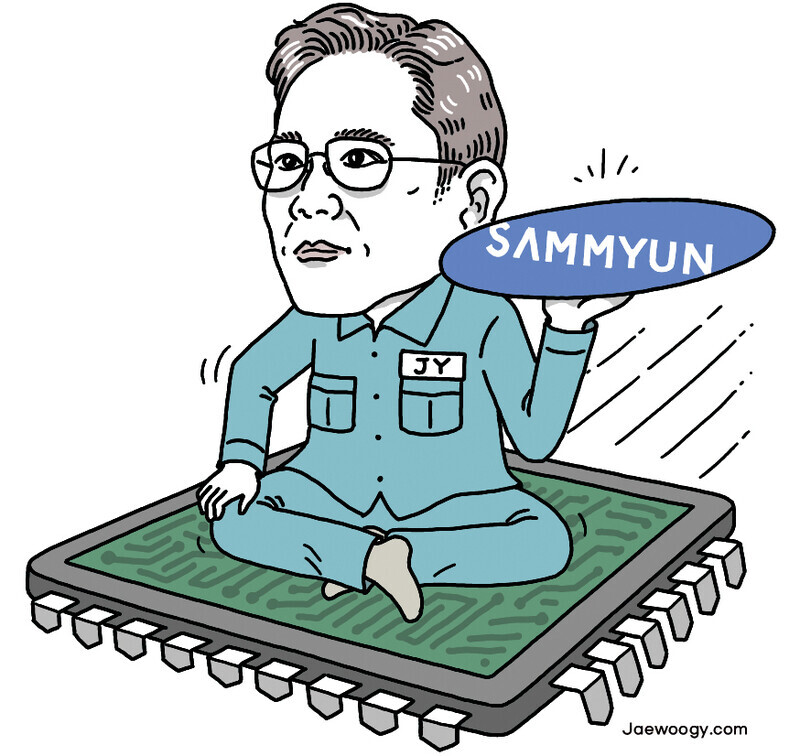hankyoreh
Links to other country sites 다른 나라 사이트 링크
[Column] Pardoning Lee Jae-yong would undermine judicial impartiality

When pardons were granted in ancient Athens, a secret vote was held, and over 6,000 fellow citizens had to approve them. While that might have been in reach for someone well-known and popular, it was a difficult task for ordinary citizens to achieve.
In the end, pardons were less a matter of justice and more a matter of how wide someone’s influence was. The absurdity of a pardon system that favors a special segment of the population has some very deep-lying roots.
Pardons have also historically played a positive role as a buffer against harsh and rigid enforcement of the law. In medieval English law, all acts that led to a person’s death were punished as severe crimes. In one case, a four-year-old girl was thrown in prison for accidentally dropping a baby in water where it drowned.
In cases of excessive punishments like these, pardons granted by a monarch were a solution that allowed judicial equity to be achieved.
In many cases of simple accidents and deaths by natural causes, people would request pardons from the outset for fear of being held responsible. At the time, however, pardons had to be bought and paid for. Poor people often opted to flee, even when they were completely innocent of any crime.
In contrast with amnesty, where all people convicted of a designated crime are pardoned, the special pardon system — where specific individuals are singled out for pardons — suffers from intrinsic fairness issues. Amnesty requests the consent of parliament, whereas special pardons are not subject even to that sort of check.
This is why special pardons should not be used, barring the existence of clear grounds for rectifying an erroneous or excessive judicial ruling.
Yet, in the history of special pardons in South Korea, it is difficult to find a single case where one served a beneficial purpose in correcting a mistaken court judgment.
Instead, special pardons have routinely served to let politicians and chaebol heads off the hook for their due legal punishments — all in the name of “unity” or “saving the economy.” These sorts of pardons violate judicial rights and undermine equality before the law.
Less than 100 days after Samsung Electronics Vice Chairman Lee Jae-yong’s sentence of two years and six months in prison was finalized, calls for a special pardon are already rearing their head. The pretext this time is the threat of a semiconductor industry “crisis” amid the battle between the US and China for semiconductor supremacy.
Lee’s sentence was finalized after he opted not to appeal. There is no case to be made that the judgment itself was unjust. Instead, it’s the typical argument in favor of affording special treatment to the chaebols.
How long are we going to persist with this practice of overtly insisting on inequality before the law?
By Park Yong-hyoun, editorial writer
Please direct comments or questions to [english@hani.co.kr]

Editorial・opinion
![[Column] Season 2 of special prosecutor probe may be coming to Korea soon [Column] Season 2 of special prosecutor probe may be coming to Korea soon](https://flexible.img.hani.co.kr/flexible/normal/500/300/imgdb/original/2024/0426/3317141030699447.jpg) [Column] Season 2 of special prosecutor probe may be coming to Korea soon
[Column] Season 2 of special prosecutor probe may be coming to Korea soon![[Column] Park Geun-hye déjà vu in Yoon Suk-yeol [Column] Park Geun-hye déjà vu in Yoon Suk-yeol](https://flexible.img.hani.co.kr/flexible/normal/500/300/imgdb/original/2024/0424/651713945113788.jpg) [Column] Park Geun-hye déjà vu in Yoon Suk-yeol
[Column] Park Geun-hye déjà vu in Yoon Suk-yeol- [Editorial] New weight of N. Korea’s nuclear threats makes dialogue all the more urgent
- [Guest essay] The real reason Korea’s new right wants to dub Rhee a founding father
- [Column] ‘Choson’: Is it time we start referring to N. Korea in its own terms?
- [Editorial] Japan’s rewriting of history with Korea has gone too far
- [Column] The president’s questionable capacity for dialogue
- [Column] Are chaebol firms just pizza pies for families to divvy up as they please?
- [Column] Has Korea, too, crossed the Rubicon on China?
- [Correspondent’s column] In Japan’s alliance with US, echoes of its past alliances with UK
Most viewed articles
- 1[Column] Season 2 of special prosecutor probe may be coming to Korea soon
- 2‘We must say no’: Seoul defense chief on Korean, USFK involvement in hypothetical Taiwan crisis
- 3Is N. Korea threatening to test nukes in response to possible new US-led sanctions body?
- 4Division commander ordered troops to enter raging flood waters before Marine died, survivor says
- 5Is Japan about to snatch control of Line messenger from Korea’s Naver?
- 6No good, very bad game for Korea puts it out of Olympics for first time since 1988
- 7[Editorial] Korea’s surprise Q1 growth requires objective assessment, not blind fanfare
- 8Korea’s 1.3% growth in Q1 signals ‘textbook’ return to growth, says government
- 9N. Korean delegation’s trip to Iran shows how Pyongyang is leveraging ties with Moscow
- 10Amnesty notes ‘erosion’ of freedom of expression in Korea in annual human rights report